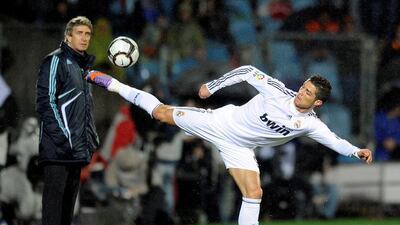Back in 2009, Manuel Pellegrini’s unveiling as Real Madrid manager was fairly low-key, at least measured by the standards of the man who followed him as manager at Spain’s most decorated club, Jose Mourinho.
Pellegrini can anticipate that Pep Guardiola, his successor at Manchester City, will hear a louder fanfare than Pellegrini had, when Guardiola takes over there.
That is Pellegrini’s way: understated, low key, at least in his public persona.
When he joined Madrid nearly seven years ago, there was not much space for another gala introduction.
The same close-season witnessed several noisy cavalcades roaring into the Bernabeu stadium.
Fans crowded into the grandstands as if for a big cup match simply to see Cristiano Ronaldo put on a podium, wearing an all-white strip for the first time, and perform some keepy-uppies. Ronaldo was presented to madridistas as the most expensive footballer in history, signed from Manchester United.
One of Pellegrini’s tasks during his single season at Madrid, the club his City take on tonight in the semi-finals of the Uefa Champions League, was to make Ronaldo feel at home and have him start paying back Madrid’s enormous investment, a fee of over €80 million (nearly Dh331m).
The Chilean manager had been asked to take over at a club in major transition.
Presidential elections had recently returned Florentino Perez to the main seat in the boardroom, for Perez’s second term in charge.
Rivals Barcelona had just won a treble.
A hero, Raul, was the club captain but well into his thirties.
Ronaldo was the new star, so was Kaka, another summer arrival.
Raul’s days were numbered.
• Read more: Five reasons why Real Madrid will win the Uefa Champions League
• Read more: Five reasons why Manchester City will win the Uefa Champions League
• Read more: Joe Hart says Manchester City have to 'believe we can win' against Real Madrid in Champions League
Some of the numbers Pellegrini’s Madrid then generated were spectacular. Raul, then the club’s greatest all-time goalscorer, may have been an irregular player in his last season at Madrid, often used from the bench, but Madrid had no shortage of goals.
They scored more than 100 times in their 38 Primera Liga matches, a new landmark. Ronaldo contributed 26 of those.
Karim Benzema, who like Ronaldo has fitness problems that could limit his participation in tonight’s first leg in Manchester, was also new to Madrid at the outset of 2009/10.
Perez had pushed hard for the recruitment of the French striker, held him in high regard and would have liked the new manager to coax more consistency from Benzema.
The player was only 21 when he joined, and his inconsistency at centre-forward betrayed an immaturity.
Competition for places in the forward line posed Pellegrini dilemmas.
There was Raul, a veteran but still an instinctive finisher with a never-say-die spirit.
There was Ronaldo.
There was Gonzalo Higuain, who outscored all of them.
Benzema remained a work in progress even when Mourinho succeeded Pellegrini.
The South American manager lasted only a year. Some at the club advised the president to stick with him.
Madrid accumulated the sort of points total that in most seasons would have won the league. But they were short of the standards set by Barcelona, then Guardiola’s Barcelona.
And in the knockout competitions, they flopped, beaten early and humiliatingly by third-tier Alcorcon in the Copa del Rey, eliminated at the last-16 stage by Lyon in the Champions League.
If the Pellegrini period at Madrid was not a glorious one, nor is it remembered as gloomy.
Hindsight permits him a pat on the back for the development of Marcelo during the 2009/10 season.
He saw the Brazilian left-back’s outstanding potential as an attacking player and used him midfield frequently to permit him to exploit that. Marcelo thrived, and has established himself as a key Madrid player since.
Pepe, the pugnacious central defender, regained respect under Pellegrini, after serving a long suspension for violent conduct the previous season.
Sergio Ramos, now Pepe’s partner, shifted across positions in defence during the Pellegrini season, and had the opportunity to show his strengths as a right-back, the position that gave him a place in the Spain national team.
He won the World Cup playing at full-back in July.
Pellegrini had by then been told to look for a new job.
sports@thenational.ae
Follow us on Twitter @NatSportUAE
Like us on Facebook at facebook.com/TheNationalSport


